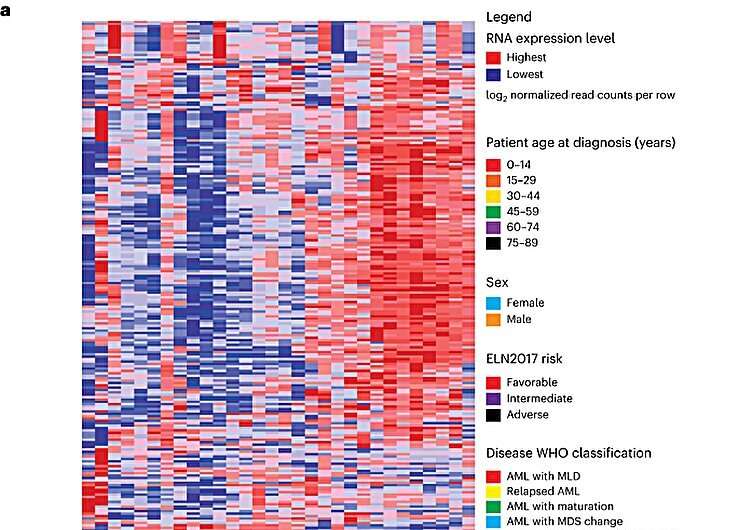This article has been reviewed according to Science X's editorial process and policies. Editors have highlighted the following attributes while ensuring the content's credibility:
fact-checked
peer-reviewed publication
proofread
Discovery unlocks potential new arsenal to target leukemia and other cancers

A discovery by a QIMR Berghofer-led team of international scientists has potentially unlocked an entirely new approach to targeting the blood cancer acute myeloid leukemia, bringing hope to patients who are no longer responding to existing treatments.
The findings
, published in the journal Nature Cancer, are highly significant not only for advancing the treatment of blood cancers but potentially other types of cancer too. The researchers made their unexpected discovery while investigating why a new class of drug, imetelstat, was effective at killing leukemia cancer cells in the laboratory. They found that the drug induces a type of cell death that has only recently been discovered, known as ferroptosis. The scientists also showed for the first time the detailed biological process that triggers this cell death in leukemia samples treated with the drug. The findings have led to a world-first phase II clinical trial of the drug in patients with myelodysplasia and acute myeloid leukemia, which is underway at the Royal Brisbane and Women's Hospital and Royal Adelaide Hospital in Australia, and sites in Germany and France. Senior author QIMR Berghofer's Professor Steven Lane said that while the work is at an early stage of discovery, it could lead to a new therapeutic strategy for
"This is very exciting because it essentially means we potentially have a new weapon to kill blood cancer cells and an instruction manual that explains how the weapon works," Professor Lane said.
Blood cancers are often diagnosed when they have spread through the body so treatments like surgery and radiation are far less effective. Traditional chemotherapies sometimes stop working and there are some patients who don't respond at all.
Novel treatments that target the blood cancer throughout the body are urgently needed.
"Having this extra weapon in our arsenal would create so much opportunity particularly in combining this drug, and others like it, with existing treatments like chemotherapy and other novel cancer therapies," Professor Lane said. "This could transform the way we think about treating patients with blood cancers, especially those who have run out of options."
Lead author Dr. Claudia Bruedigam from QIMR Berghofer said that the research involved years of tireless work by an international research team of more than 20 scientists.
"This has been a huge project with many late nights and weekends," Dr. Bruedigam said. "We were interested in the drug, imetelstat, because it targets the telomeres which are DNA sequences at the end of chromosomes. We used cutting-edge functional genetics experiments to basically knock out every single gene of the human genome in the patient samples to try to understand why it was effective against leukemia.
"It really was a 'eureka moment' when we found there was this other separate process taking place as well, the cell death pathway ferroptosis. That was incredibly exciting," she said.
Scientists globally have only just begun to explore the potential of ferroptosis, which was discovered only a decade ago. It is distinctly different to other types of cell death such as apoptosis, so could provide untapped methods of targeting cancers.
This research increases understanding of this new cell death pathway, which could be significant not only for new treatments for blood cancers, but other cancers as well.
The scientists found the drug, imetelstat, enters the leukemia cancer cell and interacts with two important enzymes that regulate fatty acid metabolism. This causes changes that lead the cell membrane to rupture, which eventually results in leukemia cell death.
Professor Lane said that the international phase II clinical trial of the drug in acute myeloid leukemia patients was at the halfway mark with the team looking to recruit another 25 patients.
"The trial has only been open for a couple of months but we have already seen some really promising signs," he said.
Professor Lane heads QIMR Berghofer's Gordon & Jessie Gilmour Leukemia Research Laboratory and is a clinical hematologist at the Royal Brisbane and Women's Hospital (RBWH). He said the research discovery would not have been possible without the support of the patients from the RBWH who donated their cancer diagnostic samples.
The study involved collaboration with The University of Queensland, Queensland University of Technology, Royal Brisbane and Women's Hospital, Children's Medical Research Institute, University of Sydney, Ulm University, Charité-Universitätsmedizin Berlin, Greifswald University Medical Center, and Memorial Sloan Kettering Cancer Center.
More information: Claudia Bruedigam et al, Imetelstat-mediated alterations in fatty acid metabolism to induce ferroptosis as a therapeutic strategy for acute myeloid leukemia, Nature Cancer (2023). DOI: 10.1038/s43018-023-00653-5

















